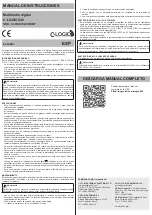
Item 63759
For technical questions, please call 1-888-866-5797.
Page 3
Important Safety Information
Read all safety warnings and instructions.
Failure to follow the warnings and instructions may result in
electric shock, fire and/or serious injury.
Save all warnings and instructions for future reference.
General Safety Rules
1.
Electrical shock can cause death
or injury! NEVER TOUCH exposed
conductors of electricity.
2.
Inspect the Multimeter before use. In addition
to a general inspection, look specifically for:
a. Pay special attention to the insulation
protecting the connectors.
b. Check the leads for exposed metal,
damaged insulation, and continuity.
c. Replace damaged test lead
immediately, before use.
3.
Do not use the multimeter if:
a. The test lead is damaged in any way.
b. The battery is low.
c. Near any explosive gasses or fumes.
d. Any abnormal operation is detected.
(If in doubt about the condition of
the meter, have it serviced.)
e. The battery cover is open.
4.
This meter should be powered only by a
single, correctly installed 9V battery.
5.
Use caution when working near
voltages above 30 VAC rms, 42 VAC
peak, or 60 VDC. Voltages this high
present a risk of electric shock.
6.
Disconnect the circuit’s power
before connecting the meter in
series, when measuring current.
7.
Connect the common (COM) test
lead first and disconnect it last.
8.
Hold the probes with fingers behind guards.
9.
Avoid electrical shock. Use extreme
caution when working near uninsulated
conductors or bus bars. Prevent body
contact with grounded surfaces such
as pipes, radiators, ranges, and cabinet
enclosures when testing voltages.
10. Observe work area conditions. Do
not test voltages in damp or wet
locations. Don’t expose to rain. Keep
work area clean and well lit.
11. Keep children away. Children must
never be allowed in the work area.
12. Stay alert. Watch what you are doing,
use common sense. Do not operate
any meter when you are tired.
13. Do not operate meter if under the influence
of alcohol or drugs. Read warning labels on
prescriptions to determine if your judgment
or reflexes are impaired while taking drugs. If
there is any doubt, do not operate the meter.
14. Due to the danger inherent in such work,
we strongly recommend that only a
licensed electrician work on high-voltage
or other potentially dangerous circuits.
15. Do not test voltage on circuits higher than
250 volts. This type of testing should
only be done by a qualified electrician.
16. Do not test current on circuits
higher than 200 mA.
17. Store idle equipment. When not in use,
meters must be stored in a dry location to
decrease exposure to moisture. Lock up
meters and keep out of reach of children.


























